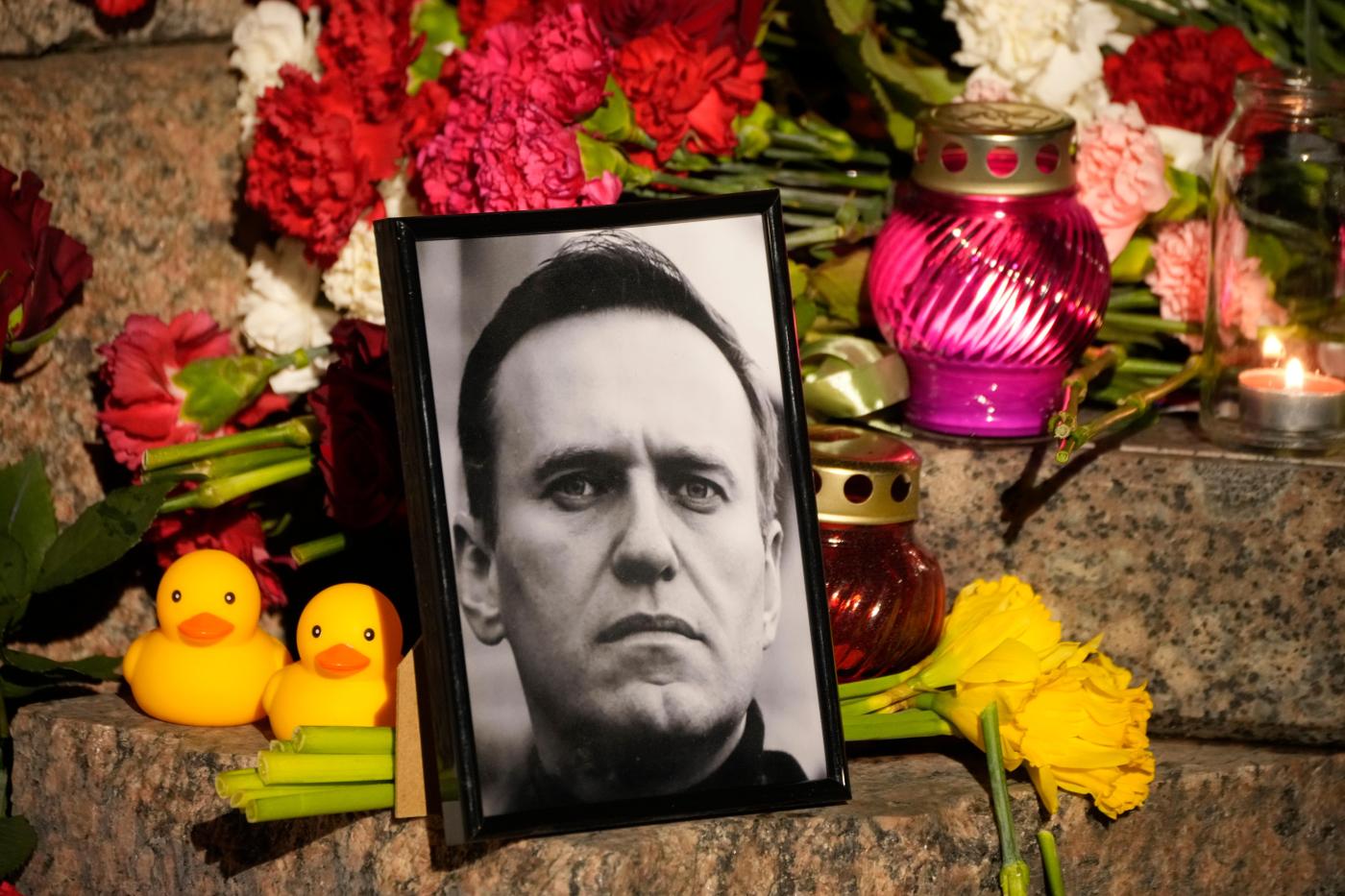
Trudy Rubin: Vladimir Putin killed Alexei Navalny. It is a stark warning to the West
Vladimir Putin killed him.
The Russian leader is as responsible for Friday’s death of Alexei Navalny — that country’s most fearless and famous opposition leader — as if he personally had shot him.
Navalny, who had rallied anti-Kremlin crowds across Russia before being jailed on bogus charges in 2021, died in a grim Arctic penal colony where he was serving a 19-year sentence. He was the latest in a long string of prominent Russian activists and journalists jailed, shot, or poisoned under Putin (Navalny barely survived a poisoning attempt in 2020).
Yet Navalny was unique. His bravery and his charisma — which I observed during several interviews on trips to Moscow over the years — made him the only Russian opposition figure with national name recognition who could rouse substantial opposition to Putin.
This put him on the Kremlin’s hit list.
Navalny’s death is a direct challenge to U.S. politicians who praise Putin, as well as the legislators who are helping him by blocking aid to Ukraine. They and other Western leaders must hold Putin directly responsible.
Underestimating the cold-blooded killer in the Kremlin is a mistake that America cannot afford.
When I last interviewed Navalny in 2018, in his sleek, spare office far from Moscow’s city center, I asked him whether he feared he might be killed. “They (the Kremlin) missed a chance when I was less popular,” he explained. “Now they are afraid they will provoke rallies or worse. Right now, the cost is higher than they want, but maybe they are still saving this tool.”
The reason Navalny was so popular at the time was his (and his young team’s) brilliant social media campaign against Kremlin corruption on YouTube and the Telegram messaging service, which won him supporters across Russia.
A lawyer by training, banned from access to state-controlled media, he still won more than 27% of the vote in the 2013 Moscow mayoral election. He signed up 20,000 young volunteers and amassed a war chest of online contributions. “We copied Obama’s method of fundraising,” he told me. He also watched the HBO series “The Wire,” to learn the ins and outs of a U.S. mayoral campaign.
Indeed, Navalny was the first Russian politician to use U.S. campaign methods, touring every region and appealing to folks on the street, especially young people, unlike stiff Russian leaders who make limited and formal presentations. He kept building his mass movement despite ongoing threats. Green dye was thrown in his face after a rally, nearly blinding him in one eye; he was banned from running for president in 2018; his brother was imprisoned as a hostage; and he was repeatedly jailed.
His Anti-Corruption Foundation put out brilliant, hilarious videos (with English subtitles) documenting Kremlin corruption, including one in 2017 on former president and prime minister Dmitry Medvedev that spotlighted his mansions and yachts. It racked up 27 million views. A 2021 video about Putin’s secret palace in southern Russia, complete with drone footage, garnered 92 million views.
His goal, Navalny told me, was to reach “blue-collar youth, not hipsters, youth who see no future” and convince them that elections didn’t have to be hopeless, and that grassroots resistance was possible. “We are the biggest movement in Russia,” he said.
No wonder Putin was afraid of this dynamic, attractive activist in his 40s who contrasted so dramatically with an aging, isolated president-for-life.
Putin finally applied the “tool” Navalny feared in 2020, when Russian intelligence officers tried to poison him with the banned nerve toxin Novichok, after he addressed a rally in Siberia. Miraculously, he survived when a private plane sent from Germany was able to evacuate him, and Berlin doctors helped him recover.
With typical Navalny panache, he then managed to track down one of his poisoners and trick the guy into thinking he was an FSB intelligence official requesting details on the failed operation. The man revealed, on tape, that the poison had been applied to Navalny’s underpants in his hotel room, and the whole hilarious episode was included in a documentary that won an Oscar last year. (Navalny later taunted Putin from prison as “Vladimir the underpants poisoner.”)
At the Oscar ceremony, Navalny’s beloved wife, Yulia, accepted the award and praised her husband for “defending democracy.” She said softly, “Alexei, I’m dreaming of the day when you will be free, and our country will be free.”
Putin wanted Navalny dead. Yet the opposition leader chose to return to Russia from Germany in January 2021, as soon as he was well enough to travel, and was jailed when he reached the Moscow airport.
Why did he return? I asked Yevgenia Albats, one of Russia’s leading independent journalists and a close friend of Navalny’s. “He knew he could not be a Russian politician who asks people to protest if he was living in the luxury of Germany,” she told me early last year. “Putin is still afraid of him,” she added. “He does understand if anyone is capable of uniting people, it is him.”
So, as Putin prepares for a sham election to return him for a fifth term as president, Navalny has been conveniently eliminated. Even in Russia’s brutal, Stalin-like gulag, where Navalny’s health deteriorated under the harshest of conditions, Putin couldn’t break him. Now he will brush off Navalny’s death as irrelevant, yet it is anything but that.
Even from prison, Navalny reminded a world of what Putin’s admirers would like to forget: that Russia is not destined by the heavens for eternal dictatorship, nor must Putin’s survival be seen as ordained.
Navalny opposed the Ukraine war and called last year for the return of all Russian-occupied territory in Ukraine. He issued a manifesto in February 2023 calling for an end to “the Putin regime” and the establishment of “a parliamentary republic based on … fair elections.”
He died fighting for democracy and free elections — values that many Americans too often take for granted. But, as Navalny reminded us, they are never guaranteed.
Shame on MAGA legislators or any GOP candidates who praise Putin and are willing to help the Russian dictator extinguish those very values in Ukraine. Shame on those who ignore the long-term threat Putin presents to the U.S., including weaponizing space.
Navalny’s death is a stark warning of the danger of underestimating Putin’s determination to challenge the West — and a reminder that we must defend our own democracy in 2024.
Trudy Rubin is a columnist and editorial-board member for the The Philadelphia Inquirer, P.O. Box 8263, Philadelphia, Pa. 19101. Her email address is trubin@phillynews.com


